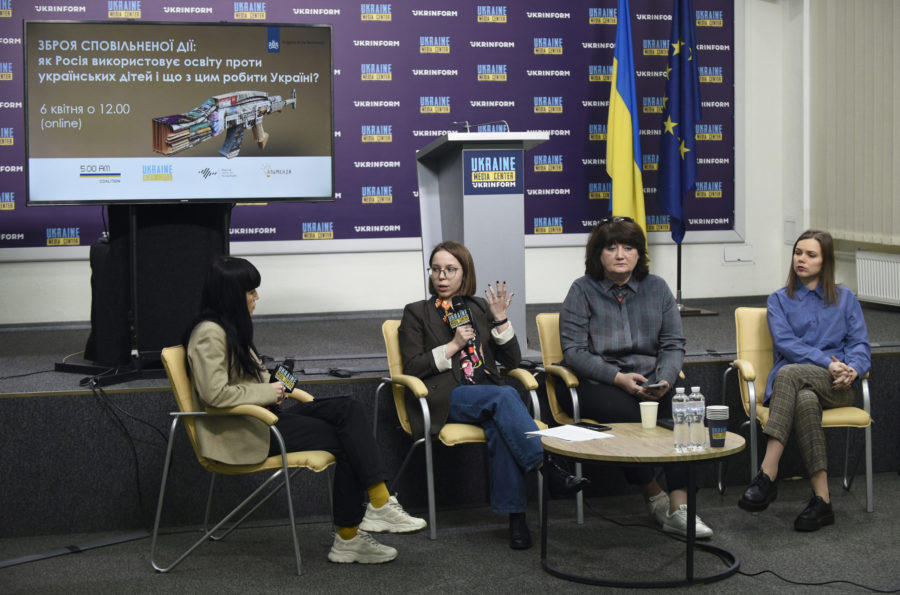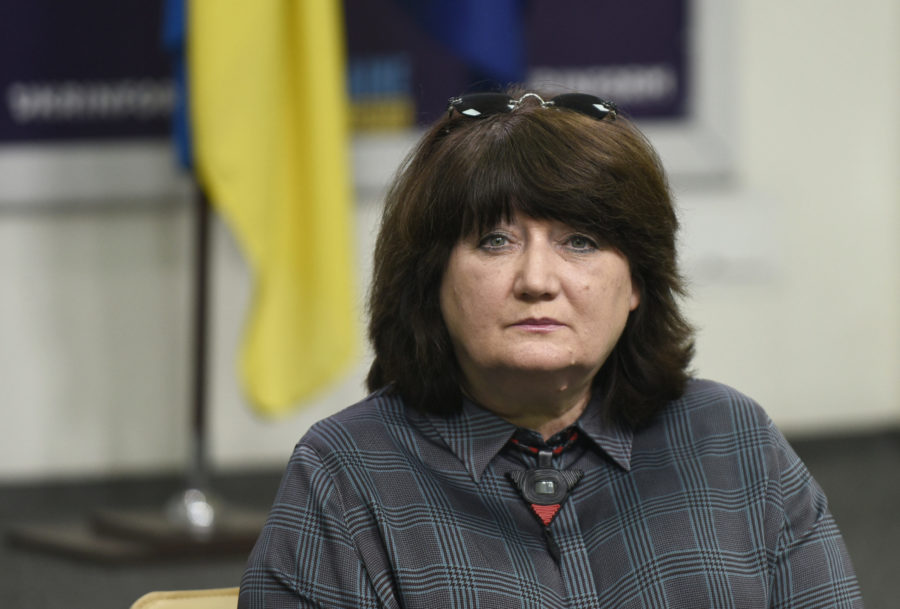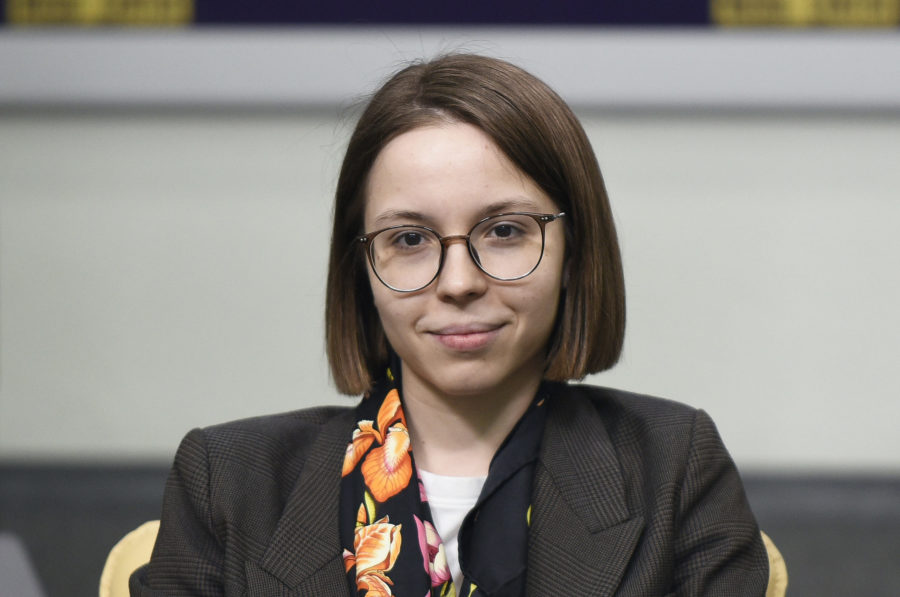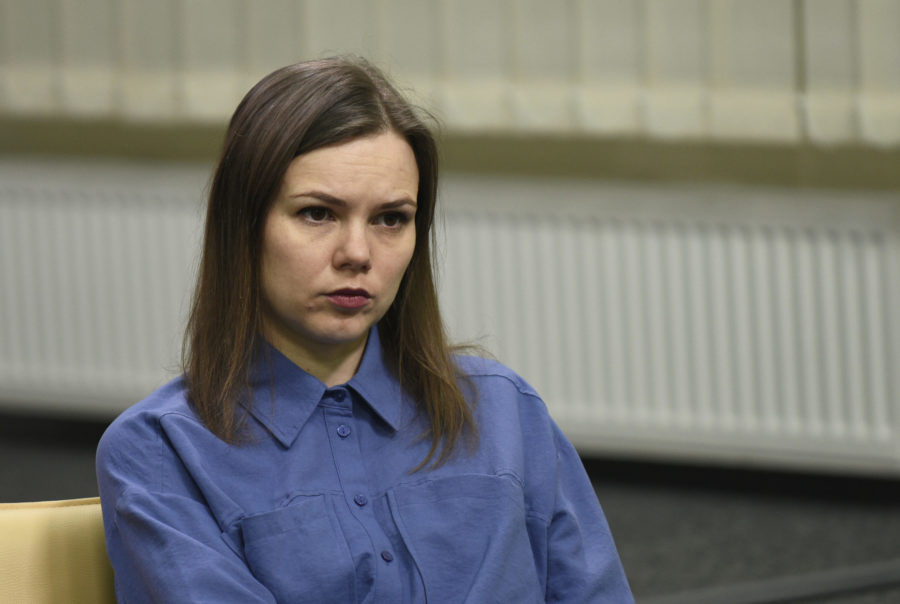Delay-action weapon: how Russia uses education against Ukrainian children
More than a million Ukrainian children in the occupied territories study according to Russian federal standards which convey propaganda ideas and deny the existence of Ukraine and Ukrainians as a distinct nation. Experts discussed the different facets of the consequences of such influence, what to do about it, and what tasks are facing both the state system and society as part of the event organized by Ukraine 5AM Coalition at the Media Center Ukraine – Ukrinform.
 Photo: Ukraine Media Centre Kyiv
Photo: Ukraine Media Centre KyivIn the newly occupied territories, Russia implements the “Crimean scenario” but in a tougher and more intense way
The arrest warrant for Russian President’s Commissioner for Children’s Rights Maria Lvova-Belova caused a stir. But this event overshadowed the children in the occupied territories. According to Valentyna Potapova, Head of the “Almenda” Civic Education Center, there are 458,000 of them in Crimea alone.
The educational influence on the younger generation is aimed at depriving them of Ukrainian identity and using ideological tools to move them from one group to another.
“The children had a cultural identity, they considered themselves citizens of Ukraine, but then the occupation took place, as a result of which the Russians destroyed everything that was in the Ukrainian education system. The horror of the situation is that these children have nowhere to go. When the ‘Crimean scenario’ began to be applied to Zaporizhzhia and Kherson regions, the first thing the occupiers did was to integrate the educational field of the Russian Federation,” Potapova says.
According to her, parents who try to resist such influence are punished. Human rights activists know of at least five fines imposed on parents in Berdiansk for the fact that their children do not attend Russian schools but study remotely using Ukrainian programs.
“A lot of money is allocated from the Russian federal budget for education, both school and non-formal. It’s like a road roller that goes over our children. Unfortunately, if we look at it from the point of view of international humanitarian law, such a violation is considered not serious, compared to the physical displacement of children. Therefore, the Russians feel impunity and continue to spread this system. If there are no changes in the perception of this crime, it will encourage other states to use a similar scenario,” Valentyna Potapova adds and says that the Ukrainian authorities must “see” these children.
 Valentyna Potapova. Photo: Ukraine Media Centre Kyiv
Valentyna Potapova. Photo: Ukraine Media Centre Kyiv“I would like the structure of the Ministry of Education to finally have a Directorate of Education for the Occupied Territories. Education should be dealt with by a specialized ministry, not the Ministry of Reintegration which already has a lot of different tasks. In his public communication, Minister Lisovyi mentioned children who get education in European countries. He said that these are our children and Ukraine will take care of them, but he did not mention a million children who are currently being forcibly educated in the occupied territories,” the human rights activist adds.
Influence on children through education contains the features of several crimes
More than 130 textbooks were thoroughly analyzed for the narratives Russia promotes through the curriculum. One of the key ones is a call for an all-Russian identity and an emphasis on the fact that other identities cannot exist in the territory of the Russian Federation. This gives rise to the idea that everyone who lives in the Russian Federation and its occupied territories should be patriots and be ready to give their health and life for it.
“As a lawyer, I see several violations from the point of view of international humanitarian law. The state that seized the territories must leave there the institutions that existed before the occupation. That is, education should develop according to Ukrainian standards. Russia ignores all laws and regulations, continues to impose its policy on educational processes, causes children to lose their Ukrainian identity. In their books, there is direct wording: Ukraine does not exist as a state, Ukrainians do not exist as a nation, only Russians exist,” says Daryna Pidhorna, a lawyer at the Regional Center for Human Rights.
 Daryna Pidhorna. Photo: Ukraine Media Centre Kyiv
Daryna Pidhorna. Photo: Ukraine Media Centre KyivShe emphasizes that Russia actively promotes militarization, commits war crimes and crimes against humanity through its curricula. According to Pidhorna, there are no provisions on education and culture policy in the Convention on the Prevention and Punishment of the Crime of Genocide. They were dismissed as not posing a mortal threat to humans.
“It is impossible to prosecute Russia [for imposing its educational system] under international norms. There are no effective countermeasures apart from condemnation and publicity at all levels. But is it worth thinking about what we should do after de-occupation. People lived there for nine years, but only last year the state of Ukraine, together with foreign governments, announced a vision of how the processes of reconciliation and recovery will take place,” says Daryna Pidhorna.
About the importance of journalistic investigations
Educational institutions that work under the jurisdiction of the Russian Federation, their teaching staff and management are accomplices in the abduction of children and their entry into the Russian educational process. How it happened with two girls who were taken from Kherson first to Crimea, and then to Henichesk. In total, they spent 11 months in the occupation, unable to return home.
Anna Babinets manages the independent investigation agency Slidstvo.Info which made the film Escape from the Russians. The journalistic team promoted the return of the deported girls home. While in Crimea, the film protagonists expressed their pro-Ukrainian position all the time, for which they were threatened with punishment and transported to Henichesk to stay in much worse conditions.
“We saw that children were taken away, allegedly on vacations – to Anapa, somewhere else, and not returned. The education system of the Russian Federation is an accomplice in the abduction of children. It was schools, universities, colleges that offered these trips, saying that they will last several weeks. But the children were not returned,” Babinets emphasizes.
 Anna Babinets. Photo: Ukraine Media Centre Kyiv
Anna Babinets. Photo: Ukraine Media Centre KyivStudying in Russian schools or colleges actually turns into “brainwashing” as children are forced to stand up every day to the Russian national anthem, political information lessons are conducted which are called “conversations about important things”.
“It is important for the world to see that this type of education means pressuring children and holding dialogue from a position of strength. The entire Russian system treats children as their property and prevents them from returning home. Journalists should show the consequences of this ‘education’: Russian soldiers, 18-20-year-old boys from Crimea, who are fighting against Ukraine on the side of the Russian army, were ten years old in 2014 when Russia seized Crimea. And these young men, brought up in the Russian reality, came to fight against their fellow citizens,” Anna Babinets summarizes.
About the strategy after de-occupation
Textbooks are only part of Russian propaganda.
“The strategy of upbringing and education implies a long-term impact. If the informational isolation and children’s stay in such an environment continues, children will accept this ideology because they stay in an environment where they have no choice. A person who lives in a homogeneous information environment acquires the characteristics of this environment in 2.5-3 years. For the nine years of occupation, people have formed in such a situation – this is a lost generation,” comments social psychologist Oleh Pokalchuk.
According to him, Russia acts as a totalitarian sect, and the entire strategy of its educational influence is non-pedagogical. After the de-occupation, it is possible to work with people from the liberated territories through desegregation – separating the group, placing these people in a pro-Ukrainian environment so that their peers talk to them first, not elders.
If you have found a spelling error, please, notify us by selecting that text and pressing Ctrl+Enter.















